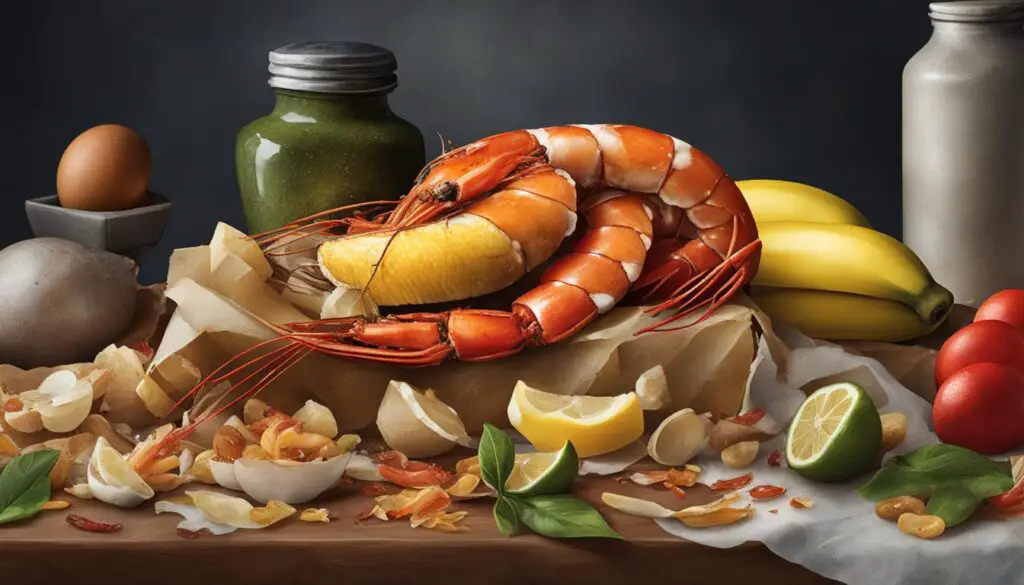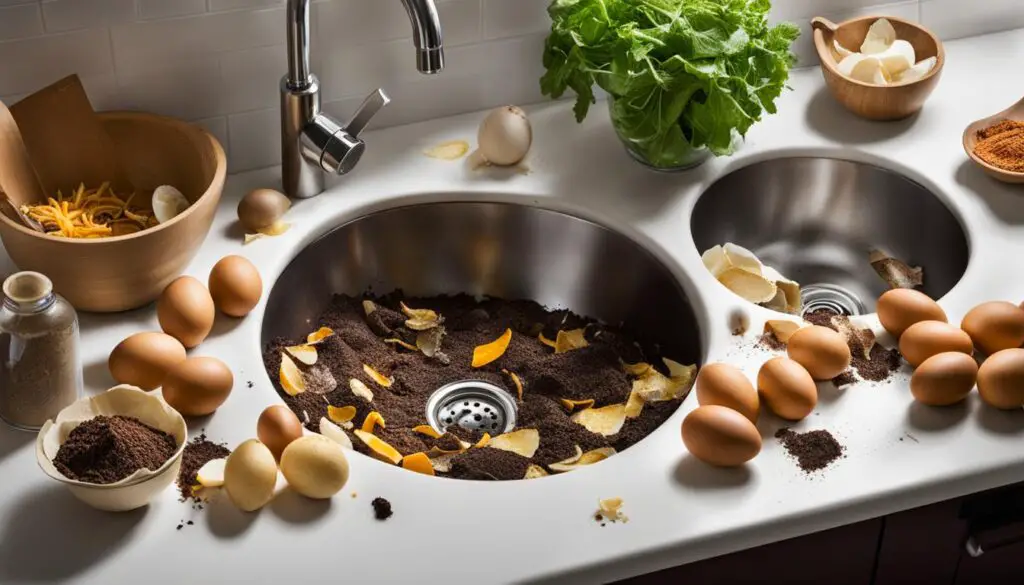Garbage disposals are a convenient appliance for disposing of food waste in the kitchen. However, when it comes to shrimp shells, it’s important to know the proper way to dispose of them. Despite the misconception that shrimp shells can sharpen the disposal blades, they can actually cause more harm than good. Putting shrimp shells in the garbage disposal can lead to jammed rotors and clogged drains, resulting in costly repairs and inconvenience.
So, what should you do with shrimp shells? Luckily, there are alternative ways to dispose of them responsibly. By following a few simple steps, you can ensure that your shrimp shells are properly discarded without causing damage to your garbage disposal or plumbing.
Key Takeaways:
- Shrimp shells should not be put in the garbage disposal as they can cause clogs and damage the appliance.
- Proper disposal of shrimp shells is important to maintain the functionality of your garbage disposal and prevent plumbing issues.
- There are alternative methods for disposing of shrimp shells, such as composting or placing them in the regular trash.
- To ensure the longevity of your garbage disposal, follow proper usage guidelines and avoid putting inappropriate materials down the disposal.
- Regular maintenance, including occasional cleaning and using ice cubes, can help prevent clogs and keep your garbage disposal running smoothly.
The Importance of Proper Usage
Proper usage of your garbage disposal is crucial for maximizing its lifespan and ensuring its efficient operation. By following a few key tips and avoiding common pitfalls, you can keep your garbage disposal in excellent condition for years to come.
Tip 1: Run Cold Water
When using the garbage disposal, always remember to run cold water while it is on. Cold water helps solidify any fats or oils that may be present in the food waste, preventing them from clogging the pipes. Avoid using hot water as it can cause these substances to liquefy and contribute to blockages in the plumbing system.
Tip 2: Consult the Owner’s Manual
Each garbage disposal model may have specific instructions regarding what materials are appropriate for disposal. It’s essential to refer to the owner’s manual or manufacturer’s website to determine which items should not be put down the disposal. Shrimp shells, crab shells, and other hard bones, for example, should be avoided as they can damage the disposal’s blades and cause mechanical issues.
Tip 3: Follow the Step-by-Step Process
When using the garbage disposal, it’s important to follow a step-by-step process to ensure its proper functioning. First, turn on the cold water, then turn on the disposal. Next, gradually feed the material into the disposal, avoiding overwhelming it with large quantities at once. Once all the waste has been processed, turn off the disposal and continue running cold water for a few seconds to flush away any remaining debris.
What Not to Put in the Garbage Disposal
While garbage disposals are designed to handle many types of food waste, there are certain items that should never be put down the disposal. In addition to shrimp shells, you should avoid disposing of coffee grounds, fibrous vegetables (like celery), greasy substances, and non-food items like glass or rubber bands. These items can cause damage to the disposal or lead to clogs in your plumbing system.
| Do’s of Garbage Disposal | Don’ts of Garbage Disposal |
|---|---|
|
|
By following these tips and avoiding the disposal of inappropriate materials, you can extend the lifespan of your garbage disposal and prevent costly repairs or replacements. Remember to consult the owner’s manual for specific instructions regarding your model, and always practice proper usage for a fully functional and efficient garbage disposal.
Common Food Waste to Avoid
In addition to shrimp shells, there are several other types of foods that should be avoided in the garbage disposal. These include:
- Un-popped popcorn kernels
- Banana peels
- Celery
- Potato peelings
- Corn cobs
- Artichokes
- Coffee grounds
- Fruit pits
- Onion skins
- Eggshells
- Rice
- Pasta
- Grease
Avoid putting these items in your garbage disposal as they can cause clogs, damage the disposal, and lead to foul odors in the kitchen. Additionally, general garbage such as rubber bands, glass, and screws should never be disposed of in the garbage disposal.
Proper Disposal Methods
| Food Waste | Disposal Method |
|---|---|
| Shrimp shells | Throw them in the regular trash |
| Banana peels | Use them as compost or throw them in the regular trash |
| Celery | Use the stalks for cooking or compost them |
| Potato peelings | Compost or throw them in the regular trash |
| Corn cobs | Compost or throw them in the regular trash |
| Artichokes | Remove the leaves and stem before composting or throwing in the regular trash |
| Coffee grounds | Use them as compost or throw them in the regular trash |
| Fruit pits | Throw them in the regular trash |
| Onion skins | Compost or throw them in the regular trash |
| Eggshells | Compost or throw them in the regular trash |
| Rice | Compost or throw it in the regular trash |
| Pasta | Compost or throw it in the regular trash |
| Grease | Allow it to cool and solidify, then scrape it into the regular trash |
By properly disposing of these food waste items, you can avoid drain clogs, maintain the functionality of your garbage disposal, and promote the safe disposal of food waste.

Expert Advice
According to plumbing experts, it’s best to think of the garbage disposal as a tool for disposing of small scraps, not a catch-all for all food waste. By following proper food waste disposal tips, you can maximize the lifespan of your garbage disposal and avoid unnecessary repairs.”
The Consequences of Putting Shrimp Shells in the Garbage Disposal
When it comes to disposing of shrimp shells, using the garbage disposal may seem like a convenient option. However, this practice can lead to serious consequences and cause damage to your kitchen plumbing system.
When shrimp shells are put down the garbage disposal, they can form a compact ball that clogs the drain. This blockage prevents water from flowing freely and can result in a clogged garbage disposal. In severe cases, the disposal may need to be taken apart and cleaned to remove the stubborn blockage.
Repairing a clogged garbage disposal can be a time-consuming and costly process. It often requires the assistance of a professional plumber to effectively remove the blockage and restore the proper functioning of the disposal unit. Avoiding the disposal of shrimp shells can help you avoid these unnecessary repair expenses.
To better understand the consequences of putting shrimp shells in the garbage disposal, consider the following comparison:
| Consequences of Putting Shrimp Shells in Garbage Disposal | Effects |
|---|---|
| Clogged Garbage Disposal | Prevents water flow and disrupts disposal’s functionality |
| Repairing a Clogged Disposal | Requires professional assistance and can be costly |
| Removing Blockages in Disposal | Involves disassembling and cleaning the disposal unit |
As illustrated in the table above, disposing of shrimp shells in the garbage disposal can have significant consequences. To maintain the proper functioning of your kitchen plumbing system and avoid unnecessary repair expenses, it is crucial to refrain from putting shrimp shells down the disposal.
Next, we will explore other types of food waste that should be avoided in the garbage disposal to prevent drain clogs and maintain the longevity of your disposal unit.
Other Food Types to Avoid
In addition to shrimp shells, there are other types of food waste that should be avoided in the garbage disposal. These foods can cause drain clogs and plumbing problems, leading to costly repairs and inconveniences in your kitchen. Let’s take a look at some of the foods you should steer clear of:
- Stringy Foods: Foods like asparagus, celery, and corn husks have long, fibrous strands that can become entangled in the disposal rotors. This can not only clog the drain but also cause unpleasant odors to linger in your kitchen.
- Starchy Foods: Potatoes, breads, and pasta tend to expand when in contact with water. When these starchy foods are flushed down the disposal, they can stick to the sides of the plumbing pipes, creating blockages and impeding the flow of water.
- Fatty Foods: Leftover fat or grease should never be poured down the kitchen sink or disposed of in the garbage disposal. These fats can solidify inside the pipes, creating stubborn blockages that can be difficult to remove.
To maintain a functional and efficient garbage disposal, it’s important to dispose of these foods properly. Consider alternative methods of disposal such as composting or placing them in the regular trash instead. This will help prevent drain clogs and keep your plumbing system running smoothly.

Best Practices for Garbage Disposal Maintenance
To ensure the optimal performance of your garbage disposal and prevent clogs, it is important to follow some maintenance tips. Here are some effective practices:
- Use Ice Cubes: Occasionally, put a few ice cubes down the disposal while it is running. The cold temperature and abrasive nature of the ice help dislodge any accumulated food particles from the blades. This simple step can improve the disposal’s efficiency and prevent blockages.
- Utilize Citrus: Another way to freshen up your disposal is by using citrus. Toss orange peels, citrus rinds, or even orange slices down the disposal. The citrus oils release a refreshing scent while the acidic nature helps combat any lingering odors. It’s a natural and budget-friendly way to keep your disposal smelling fresh.
- Clean Regularly: Keep your garbage disposal clean by regularly running cold water and dish soap through it. This helps break down grease and eliminates any buildup of bacteria or food debris. To enhance the cleaning process, you can also use a disposal cleaning tablet or make a DIY cleaning solution using vinegar and baking soda.
Following these garbage disposal maintenance tips can help prolong its lifespan and maintain its optimal functionality. Remember to avoid putting inappropriate materials down the disposal and always consult the manufacturer’s guidelines for proper usage.
“Regular maintenance and proper usage are key to a trouble-free garbage disposal.”
Garbage Disposal Maintenance Checklist
| Garbage Disposal Maintenance Tasks | Frequency |
|---|---|
| Cleaning with cold water and dish soap | After each use |
| Using ice cubes for dislodging food particles | Monthly |
| Utilizing citrus for freshening up the disposal | Weekly |
| Regularly checking for leaks or unusual noises | Every 3 months |
| Tightening any loose connections | As needed |
Incorporating these maintenance practices into your routine can help keep your garbage disposal in top shape and prevent any inconvenient clogs or malfunctions.
Professional Help and Conclusion
If you’re facing a severe blockage or damage to your garbage disposal, it’s crucial to seek professional assistance. A qualified plumber possesses the expertise to effectively clear any blockages and address any issues with the disposal. They can diagnose the problem, provide professional garbage disposal repair services, and ensure that your disposal is functioning optimally.
Knowing when to call a plumber for disposal issues is essential. If you’ve tried troubleshooting methods like resetting the disposal or freeing any visible clogs but the problem persists, it’s time to reach out to a professional. Additionally, if you notice unusual noises, persistent odors, or leaks coming from the disposal, it’s best to have a plumber inspect it.
In conclusion, it’s important to be mindful of what goes down your garbage disposal to maintain its functionality. Avoid putting inappropriate materials like shrimp shells, as they can lead to clogs and damage the appliance. By adhering to proper usage guidelines, avoiding problematic foods, and carrying out regular maintenance, you can prolong the lifespan of your disposal and prevent avoidable issues.
FAQ
Can I put shrimp shells in the garbage disposal?
No, shrimp shells should not be put in the garbage disposal. They can jam up the rotors and contribute to drain clogs.
What types of food waste should I avoid putting in the garbage disposal?
In addition to shrimp shells, you should avoid putting un-popped popcorn kernels, banana peels, celery, potato peelings, corn cobs, artichokes, coffee grounds, fruit pits, onion skins, eggshells, rice, pasta, grease, and general garbage like rubber bands, glass, and screws in the garbage disposal.
What are the consequences of putting shrimp shells in the garbage disposal?
Putting shrimp shells in the garbage disposal can lead to clogs and blockages. The shells can form a ball and clog the drain, preventing water from flowing freely. In severe cases, the disposal may need to be taken apart and cleaned to remove the blockage.
Are there any other types of food waste that should be avoided in the garbage disposal?
Yes, other types of food waste to avoid in the garbage disposal include stringy foods like asparagus, starchy foods like potatoes and breads, and fatty foods like leftover fat or grease. Stringy foods can become entangled in the disposal rotors and cause odors, while starchy foods can stick to the sides of the plumbing and contribute to clogs. Fatty foods can solidify in the pipes and create blockages.
What are some best practices for garbage disposal maintenance?
To maintain your garbage disposal and prevent clogs, it’s recommended to occasionally put ice cubes down the disposal. This can help dislodge any accumulated food particles on the blades. Some people also suggest using ice cubes made from lemon juice or vinegar for a fresh scent. Tossing orange peels, citrus rinds, or orange slices down the disposal can have a similar effect while adding a pleasant citrus scent.
When should I seek professional help for my garbage disposal?
If you encounter a severe blockage or damage to your garbage disposal, it’s best to seek professional help. A qualified plumber can effectively clear any blockages and repair any issues with the disposal.

